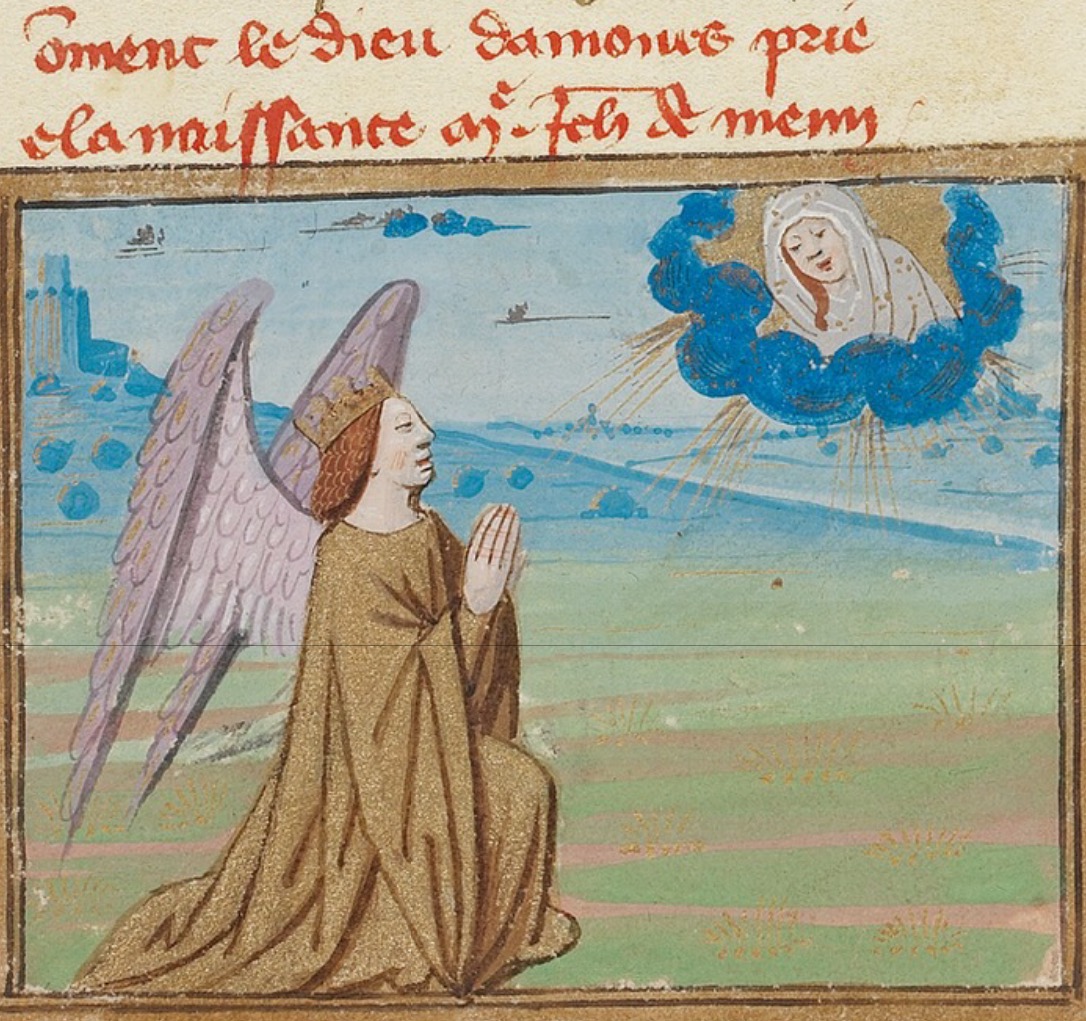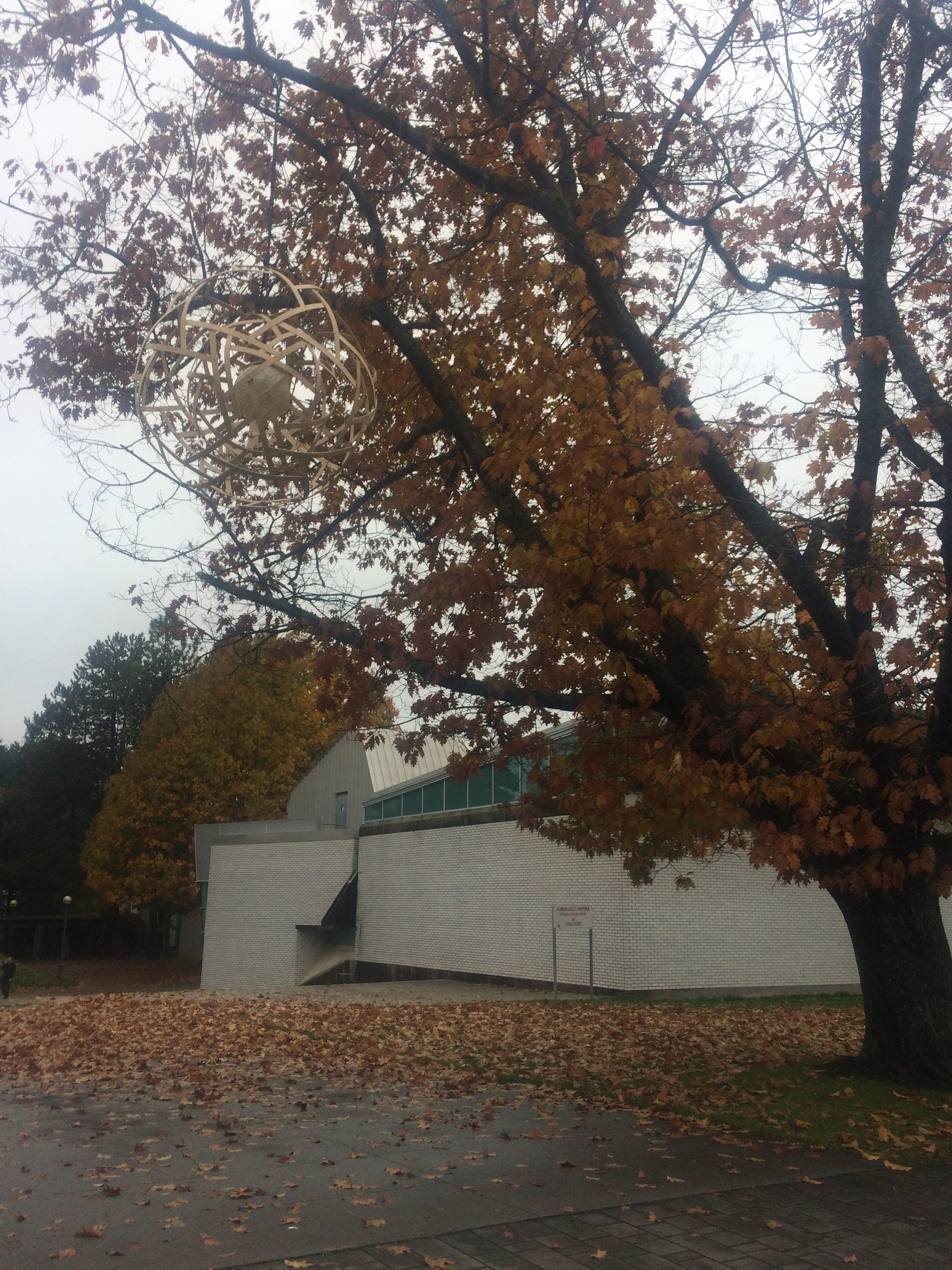
Worlds within worlds in chasmic mise en abyme: Ferrell Rose 65v: the God of Love prays for the birth of Jean de Meun
RHETORIC
- reading: Love & Genius, sermons (Roman de la Rose 26-43, 158-68, 300-18)
TUESDAY
1. Discussion of blog questions & comments on week 5
2. Rhetoric in applied practice: persuasion and teaching and learning (and a test! for the lover, not for you…)
- “Love,” who he is, and his 10 Commandments
- Context and intertext:
—Canonical laws of love: The Bible (Exodus 20:1-17, Deuteronomy 5:4-21, Leviticus 19:18, John 13:34 (inter alia)) & Ovid
—[LATER] Literary laws of love: 12th-13th c. Old Occitan (“Troubadour”) & Old French courtly lyric poetry, judici d’amors, Andreas Capellanus De amore
—Feudal relations: including promises, questions, consultation, discussion, & assent/consent
—To think about: ethics and choices (predestination, obligation, and free will) - Authorities, authors, and Guillaume de Lorris & Jean de Meun
3. Image work with interactive Bosch Garden of Earthly Delights
THURSDAY
1. Student Liberal Art group presentation: rhetoric
2. Reading:
- Rhetoric in action: Genius & his speech to the Army of Love (300-18)
- Prayer (thank you Love; which already joins a whole audience together & is supposed to unite them on an equal footing), appeal to authority (Nature), flattery, threats & fear, promises & hope, appeal to good judgement
- Summaries & synopses, mini-conclusions
- Use of striking imagery, repetitions, variations, mixing & remixing: to make memorable
- Logos, ethos, pathos:
Consider who the intended audience/s is/are and how they are being appealed to:
—Nobility: the “barons” as generals, leaders of troops; lords; lesser nobles who are knights; and the king himself, Love
—Army = the rest of the troops: while war-making is part of their feudal obligations/service, in their day-to-day lives they would be peasants, farmers, carters, porters, craftsmen & skilled workers (= work requiring an extensive apprenticeship before mastery is attained, ex. smiths, builders, boat-builders, weavers), and unskilled/general labourers
+ non-fighting troops, some of whom would be providing service using their everyday skills: support & logistics ex. cooks, bakers, cleaners, medics & other healers, people to fix tents & clothing & shoes & weapons & armour, people to look after horses & people (housekeeping, household management, organisation)
+ the latter category would usually include women (and, in some situations, they could also be active combattants): some appeal to them through imagery around spinning, weaving, textiles (& some “good” female figures doing such work); remembering that textile-making is a valuable, valued, prized craft and art (and indeed one of the grey areas of overlap between “art” and “craft”) - Consider also (for next week: points bringing together the Genius and False Semblance parts of the Rose):
—How far is this romance (or: how far is this still) a “courtly” work?
—Where are the urban and mobile skilled/specialised crafters, tradesmen, traders, merchants?
—What is the role of clerks here?
Appealed to through references to writing & studying
= religious / clerics (in training or ordained); clercs in training = students; clerc-professional-writers, white-collar literate workers, scribes, secretaries, recorders, note-takers, historians, storytellers; and anyone literate & anyone with a liberal arts education (or equivalent) is a potential future reader… and writer… - Bearing in mind that, like any 13th-century sermon in the actual western European world of that time, it contains multiple meanings for multiple audiences; some messages are themselves multiple and for multiple audiences simultaneously; some are ironic, parodic, and/or pastiche; some contain satirical comment; some such commentary is more subtle, sophisticated, subversive. Reading between the lines, in what looks like an empty space between the end of one line of verse and the start of the next … following the mixed metaphor of agriculture, the plastic arts, and writing in verse
- Background: speeches, sermons, “lessons,” & education; exhortations to troops before battle; Crusading propaganda
- “Using one’s tools” and other colourful vivid agricultural and natural imagery, as a guide to writing & other productive purposeful labours, their value (“honour,” “honourable”) & the continuation (and real test/ing) of higher education in the translation of its allegories, abstracted lessons, & higher abstract knowledge to life.
NB: “Genius” is etymologically / philologically related to ingenuity and engineering - + your choice of passage from this week’s reading!
- Images from class (coming late Thursday/Friday): the Rose as a poem, poetry as literature, poetry as an art-form using words but that can also go beyond written culture (epic, storytelling, song, dance, performance-art), and seeing poetry in the surrounding world
